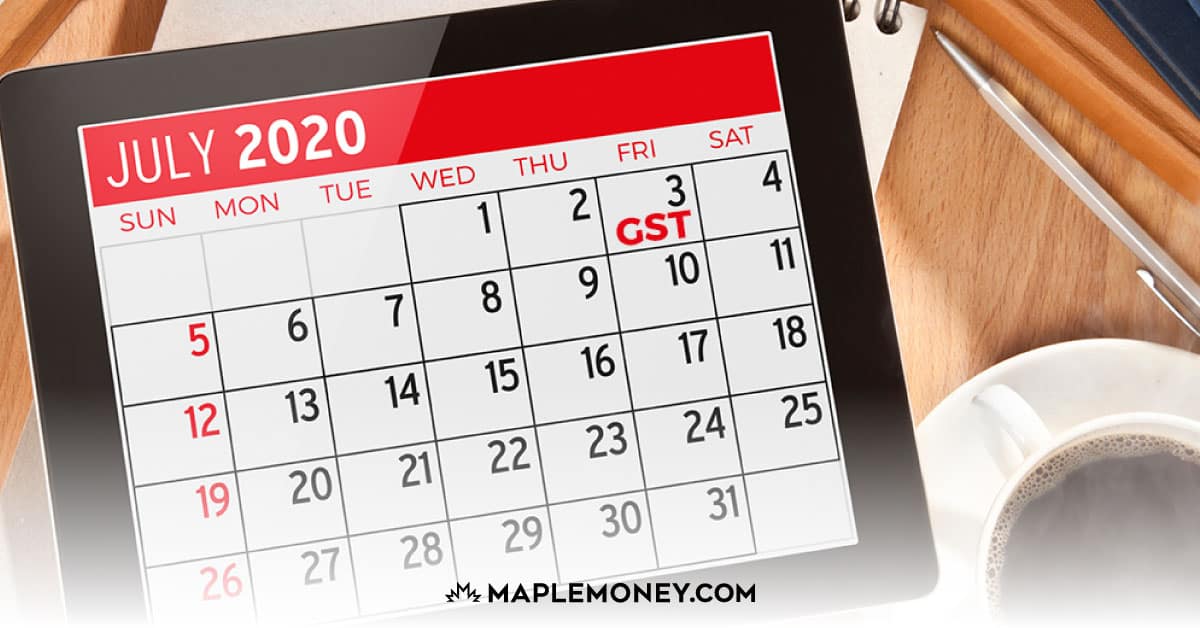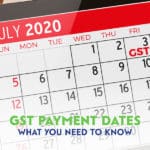GST Payment Dates: What You Need to Know

Recently, I published an article which included the monthly payment dates for CPP and OAS government pensions. This time around, we’re taking a look at the quarterly Goods and Services Tax (GST) rebates that millions of Canadians receive each year. If you’re wondering if you are eligible to receive a GST rebate, or when you can expect GST cheques to arrive in the mail, it’s all here. But first, let’s take a closer look at what the GST/HST credit is all about.
What Is the GST Credit?
The GST/HST credit is a quarterly non-taxable benefit issued to eligible Canadians by the federal government each year. The payment is targeted to individuals and families reporting a low to modest level of income. To be eligible, one of the following criteria must apply:
- You are a resident of Canada (in the month before and at the beginning of the month the credit is made)
- You are 19 years of age or older
- You have (or had) a spouse or common-law partner
- You are (or were) a parent, and live (or lived) with your child
If you are not a resident of Canada for income tax purposes, are currently incarcerated in a prison for a period 90 days or longer, or you do not pay tax in Canada (for a variety of reasons), you are likely not eligible to receive the GST/HST credit, even if your income falls within the guidelines.
GST Rebate Dates for 2022 and 2023
For 2022, the GST/HST credit will be paid on the following dates. If your quarterly credit amount will be less than $50, the CRA will pay you the full annual amount on the July payment date.
- January 5, 2022
- April 5, 2022
- July 5, 2022
- October 5, 2022
- November 4, 2022 (One-time GST payment to support Canadians)
- January 5, 2023
- April 5, 2023
Why Is the GST/HST Credit Paid Out to Canadians?
The purpose for the quarterly GST credit is to offset the cost of the Goods and Services Tax (GST) for Canadian individuals and families living on a low to modest income.
Harmonized Sales Tax (HST) Explained
The way sales tax is collected in Canada varies from province to province. GST is a federal sales tax, currently set at 5% on the purchase of many goods and services. Five Canadian provinces combine their provincial sales tax with the GST. The combined tax is called the Harmonized Sales Tax, or HST:
- New Brunswick, Newfoundland and Labrador, Nova Scotia, and PEI: 15%
- Ontario: 13%
The following provinces collect a Provincial Sales Tax (PST) separately from the GST:
- Manitoba : 7%
- Quebec : 9.98%
- Saskatchewan: 6%
- BC: 7%
Lastly, one Canadian province (and three territories) do not collect a provincial sales tax. In those jurisdictions, the only sales tax charged is the GST:
- Alberta
- Northwest Territories
- Nunavut
- Yukon
GST Payment Schedule
Similar to the Canada Child Benefit (CCB), GST payments are set on a July to June schedule each year, with the benefit amount being recalculated annually based on your income from the previous tax year. For example, in July of 2020, your benefit will change based on the information from your 2019 income tax return. When you apply for the Canada Child Benefit after the birth of your child, the CRA will automatically provide a GST credit for your child.
How Much Do You Get for GST?
The amount you receive is calculated based on the following two pieces of information: the number of eligible children registered for the GST/HST credit, and your adjusted family net income for the current base year. Your net family income for 2019 will be used to determine the quarterly payment you will receive beginning in July 2020.
Are Newcomers to Canada Eligible?
Newcomers to Canada may be eligible to receive the GST credit for the year that they became a resident of Canada. To apply, you simply need to fill out and send in Form RC151. While it’s mandatory that GST applicants have a Social Insurance Number (SIN), newcomers to Canada can still receive a GST credit even if they cannot get a SIN number. They will need to provide an explanation in the RC151 form, and send in an additional identification document, such as a passport of driver’s license.
Final Thoughts on the GST Credit
If you are not receiving the GST/HST credit, you could be missing out on a substantial government benefit 4 times each year. Thankfully, you have up to 3 years to request a retroactive payment. The first step is to make sure you’ve filed your income taxes, as it is a requirement to collect GST. Without filing, the government won’t know your net income, which they use to calculate your payment amount. Even if you’re new to Canada, you may qualify for the year you became a resident, but remember, to be considered you’ll need to submit a manual application.

